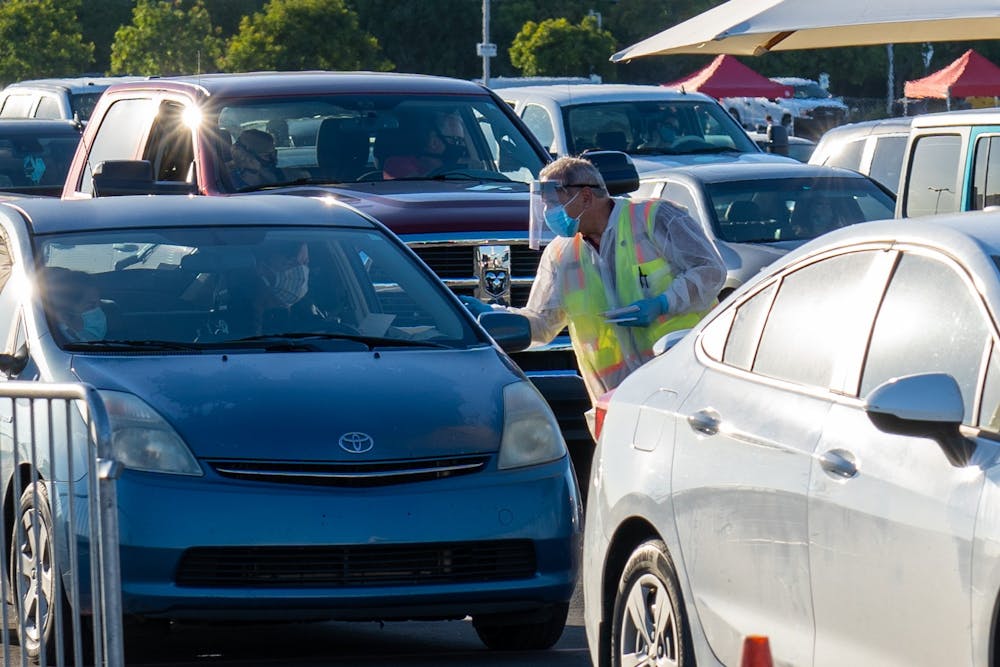In five hours, nearly 2,000 people were tested for the coronavirus using the Biodesign Institute's new saliva-based test at the State Farm Stadium parking lot in Glendale Tuesday morning.
Biodesign developed the test in May, which is a simpler, easier, safer and just as accurate way to test people for COVID-19 compared to the typical nasal swabs used to conduct the tests.
The simple process and Biodesign’s ability to conduct thousands of tests daily has earned the University a $12.7 million partnership with the Arizona Department of Health Services to provide 100,000 of the tests throughout the state.
READ MORE: ADHS partners with ASU to provide saliva-based COVID-19 testing
Since partnering with the ADHS on July 9, ASU has tested about 10,000 people for the coronavirus before Tuesday’s event, according to Joshua LaBaer, the director of the Biodesign Institute.
To be tested, individuals must pre-register and create an account for the ASU Biodesign Clinical Testing Lab Portal. Once an account is created participants can schedule an appointment at one of two locations: the Ellie Towne Health Center or State Farm Stadium. A barcode is given for workers to later scan as well.
At the site, the testing process is simple. Drivers enter the parking lot and confirm they are registered. Then they can proceed to the triage station, where volunteer nurses and others hand out a test tube and a straw.
Next, drivers weave their cars through the parking lot until they reach a place to stop and spit into the straw, which is inserted into the test tube. The saliva sample is then dropped off at the clinical station.
At the clinical station, workers make sure the sample is good and then scan a barcode on the individual's phone and another on the test tube to assign the test results with that person. From there, the saliva goes to a lab for testing.
“This is a team effort,” said David Thomas, who works at the site and is the CEO of ASU Research Enterprise. “One thing I say just about every time we come together … is that when we’re here we are one team and we are here for the community.”
The entire process typically takes between 10 to 20 minutes and results are turned in 48 hours.
Arizona has 165,934 confirmed cases of the coronavirus, with 2,107 reported Tuesday, according to the ADHS website. Arizona experienced an exponential growth of cases in May and June, but since then the case totals have started to decline, according to data from The COVID Tracking Project.
However, Sonora Quest — one of the state's largest labs — is reporting a backlog of 39,000 tests. Meaning that Arizona's data might not be as promising as it looks.
“The best way to stop this virus is to inform people where it is,” said LaBaer.
Without an effective treatment or vaccine, testing for the coronavirus is “the best tool we have” to limit the spread of it, LaBaer said. With ample testing and quick turnaround times from Biodesign, something the state and country have struggled with, people will know if they have contracted the virus and can then isolate themselves.
Personal protective equipment is provided on-site, along with training to ensure proper procedures are followed and workers are safe, Thomas said.
Sanitizing stations are located behind the clinical stations and the PPE is disposed of in biohazard bins located within the “hot-zone” where the test tubes are received, Thomas added.
Many of the volunteers at the site are students and workers from ASU. Cameron Decker, a sophomore double majoring in civic and economic thought and leadership and global agribusiness, has helped out at five of the testing events since the state announced its partnership with the University.
Decker works on the clinical end, scanning people’s barcodes to connect their testing website profile with their testing specimen, which allows people to receive their results online.
“We can get a car out of there in 30 seconds or less which is quite awesome because that's so much faster than other tests,” Decker said.
The lab can currently conduct 4,000 tests a day, but plans are in place to quadruple that number over the coming months to continue to serve the ASU community and the state, LaBaer said.
Future testing site locations can be found on the ADHS website.
Reach the reporter at wmyskow@asu.edu and follow @wmyskow on Twitter.
Like The State Press on Facebook and follow @statepress on Twitter.

Wyatt Myskow is the project manager at The State Press, where he oversees enterprise stories for the publication. He also works at The Arizona Republic, where he covers the cities of Peoria and Surprise.




